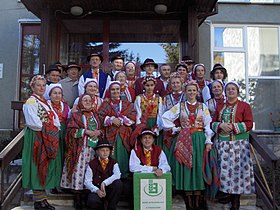Vilamovians
 Vilamovians in national costumes, Wilamowice, Poland | |
| Regions with significant populations | |
|---|---|
| Languages | |
| Wymysorys, Polish | |
| Religion | |
| Roman Catholic[citation needed] | |
| Related ethnic groups | |
| Flemish people, Poles |
Vilamovians[a] are a Germanic-speaking peoples and an ethnic group in Poland, living in the town of Wilamowice near Bielsko-Biała, who speak the Wymysorys language and maintain their own folk costumes and traditions.[1]
History
During the Mongol invasion of Europe, the area was left depopulated and was subsequently settled by German, Scottish and Flemish settlers. Over time the colonists were assimilated, with the exception of Wilamowice.[2] Vilamovians' traditions say they are descendants of immigrants from Flanders.[3] [2]
After World War II, Vilamovians were harshly persecuted in Communist Poland, since they were regarded as Germans. Their language and costumes were banned in 1946. Some of them were moved to "Recovered Territories".[2] A considerable number of representatives of this group live in Austria.[4]
As of 2018[update] about 300 people in the community could understand the Wymysorys language and approximately 60 people had the ability to speak it.[2]
Notable Vilamovians
See also
Notes
- ^
- Wymysorys: Wymysiöejyn
- German: Wilmesauer
- Polish: Wilamowianie ([vilamɔvjaɲɛ])
References
- ^ Grzenia, Jan. Słownik nazw własnych. Warsaw, Wydawnictwo Naukowe PWN, 2002, s. 370. ISBN 83-01-13710-X.
- ^ a b c d Magda Szkuta, A Mysterious Linguistic Enclave in Southern Poland, December 11, 2018, British Library, European Studies blog
- ^ Kostrzewa, Julian. "Martwy język żywych ludzi". Za Miastem (in Polish). Archived from the original on August 3, 2010.
- ^ "Mountains, hills, cover us!" - Wilamowianie in the face of post-war persecution
Further reading
- Bazielich, Barbara. Strój wilamowicki (Atlas polskich strojów ludowych. Cz. 5, Małopolska ; Z. 15), Wrocław: Polskie Towarzystwo Ludoznawcze, 2001, ISBN 83-87266-65-5
- Adam Kleczkowski, Dialekt Wilamowic w Zachodniej Galicji. Fonetyka i Fleksja, 1920 (Google Books, full text) - The introduction includes historical and ethnographical information
External links
- Stowarzyszenie na rzecz Zachowania Dziedzictwa Kulturowego Miasta Wilamowice "Wilamowianie"
- Ynzer łidła – nasze pieśni (Ynzer Łidła – Our Songs). Songs, Lullabies and Counting-out Rhymes from Wilamowice
